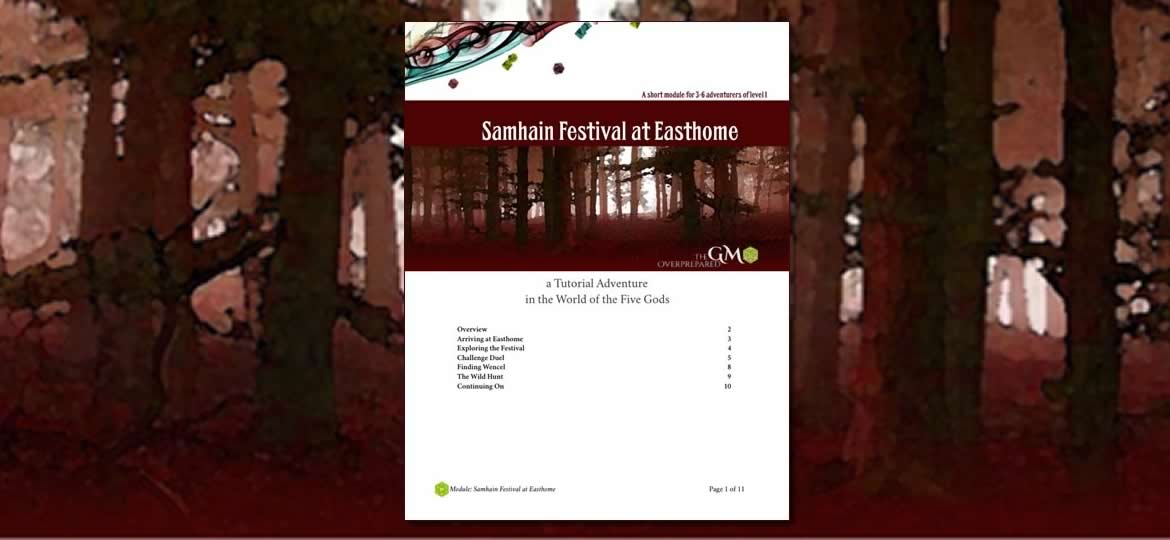I recently started GMing a new campaign in a new, custom setting for a new, homebrew system. One of my players was entirely new to RPGs and another had only played once decades ago and wasn’t sure if he’d enjoy it. And neither of them new a couple other people who were going to play. I decided we’d all be better off by having a one-shot that allowed all of us to get a better handle on what to expect and what it would be like to play together.
Assessing the Players
Before I began, I used survey monkey to send out an electronic survey to get an idea of what everyone wanted out of the game, and to help me decide on some pre-made characters for those who didn’t know enough about the rules to make their own characters. It worked out pretty well. I sent an email with the survey link. They filled it out in just a couple minutes, and then I could email those that were interested in help with my recommendations based on what they said they cared about.
Designing the Module
I wanted a quick one-shot that could accomplish three things:
- Give the new players a taste of what roleplaying is like so they could decide if they wanted to keep playing with us
- Give everyone a chance to get to know one another
- Teach the new players enough of the rules that they feel like they understand how to play
I only had one shot to introduce the game well (Get it? One shot? Nevermind), so I had to decide what were the top priorities to have in the module in that session. After some dithering and contemplation of the system, I decided I needed to include three things: freeform roleplaying, a structured skill challenge, and a true combat encounter. I also wanted to give them a bit of a sense of the world and my style as a GM. All within a 3-5 hour block of time. No pressure.
I decided to make a linear module centered about a day at a big festival that did a little of each thing. Feel free to download it from the Featured Downloads on the right column.
Prepping the Players
For the new players, I emailed them a short, verbal description of their characters and motivations. For the existing players, I discussed with them what they wanted to play. I wanted the players to all end up in the entourage of one of the Wealding clan lords, so I negotiated with the players a bit to figure out how each of them got there. In the end, we decided
- Brennus the Sorcerer would already have Lord Horseriver as his patron. As one of the more charming and cosmopolitan of his underlings, Horseriver would have asked Brennus to act as host and diplomat to this various guests.
- Iseult the Bard was from a different clan, but she’d be studying with the clan Horseriver skyseer and would be one of his valued guests
- Khepri the Empath, the foreigner, was searching for her missing countrymen and had hired…
- Oenghus the Ranger on her way into the country. Since Oenghus was looking for a reason to leave home and adventure, he decided to be her guide and introduced her to…
- Lorkan the Druid, who, as a member of the wisdom caste, would be a logical place to ask for assistance from the council of Elders in the capital. Lorkan was already on his way to the capital to deliver a magnificent horse to lord Horseriver. Since Horseriver was just on his way to the captial for the Samhain festival, he invited his new guests to join everyone where he could entertain them in style.
So, they’re all in the Horseriver entourage going to the capital. They don’t all know each other in the beginning, but they all have a reason to be there and to attend the festivities together.
I also printed out the character sheets and power cards for the new players. I decided not to go over the rules with the new players ahead of time. I thought it would make more sense for them to learn them as part of playing rather than them trying to memorize rules out of context. One of the players got wildly curious about the rules so I don’t know if I’d keep it as much a surprise if I were to do it all over, but it worked out well enough.
Running the Session
We ate lunch together first and had a chance to get to know one another before the game started. When everyone was fed and happy and having fun socializing, we dived into the session.
- GM’s Log: Here are the session notes, posted to World Anvil.
- Iseult’s Diary: And here’s the session from L.’s point of view, also on World Anvil
The highlight was a roleplaying scene I had set up using one of the PCs backstories. I had been thinking about how to get them into combat, and I wanted to find a way to make it lighthearted, but where they couldn’t fast talk their way out of it.
One of the experienced players had created a very zen-monk-enlightenment sort of druid character, whose history involved being given insurmountable tasks by a tree-saint. One of the tasks was to catch a hundred fish and feed them to pilgrims. Eventually he was able to do so and it resulted in him gaining insight and wisdom.
Anyway, I had my daughter play a guest NPC – a very pregnant hysterical lady warrior who accused the druid of causing her pregnancy. The player was totally caught off guard, and my daughter loved hamming it up. The rest of the players soon got into the drama, and they figured out that all the women who ate his fish got pregnant, so that’s why the woman thinks his fish did something mystical. She tried to challenge him to a duel, but her husband convinced her to let the rest of the family fight the rest of the PCs in an honor duel. Afterwards, they bought them some ale, because that’s how they roll in the Weald.
It’s been over a month since, and I can’t even count the number of times fish have been brought up. It’s definitely one of those moments that will make it into campaign lore.
Following Up
I originally set up the module as a one-shot so that if people wanted to change characters afterwards, we could leave this group behind and get a real start later. Everyone wanted to keep what they had though, so we set the date for another session and ate dinner. (Yes, I like feeding people a lot. I’m Latina and a mom; it’s required.)
I also tried my hand at writing the module up for other people to use. I think eventually I’ll port it to pathfinder or D&DNext, but that’s work enough for another day.



This is the first “tutorial” session I’ve ever run before, and — while I was initially skeptical that it might feel awkwardly scripted — nothing could have been further from the truth. My favorite part (aside from the hilarious episode with the fish, of course) was the skill challenge. It was really refreshing as a player to have my “skills” require some roleplay explanation rather than simply “I roll to see if I Influence him.” Definitely looking forward to more of those in the future!